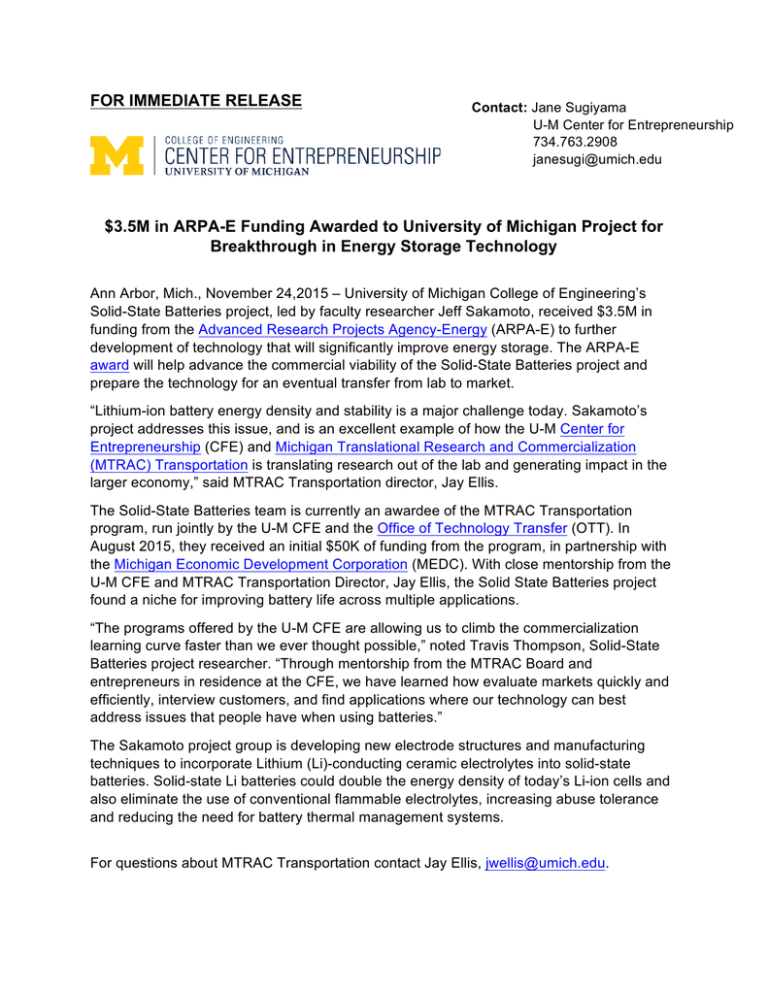3.5M ARPA-E Funding Solid State Batteries_final
advertisement

FOR IMMEDIATE RELEASE Contact: Jane Sugiyama U-M Center for Entrepreneurship 734.763.2908 janesugi@umich.edu $3.5M in ARPA-E Funding Awarded to University of Michigan Project for Breakthrough in Energy Storage Technology Ann Arbor, Mich., November 24,2015 – University of Michigan College of Engineering’s Solid-State Batteries project, led by faculty researcher Jeff Sakamoto, received $3.5M in funding from the Advanced Research Projects Agency-Energy (ARPA-E) to further development of technology that will significantly improve energy storage. The ARPA-E award will help advance the commercial viability of the Solid-State Batteries project and prepare the technology for an eventual transfer from lab to market. “Lithium-ion battery energy density and stability is a major challenge today. Sakamoto’s project addresses this issue, and is an excellent example of how the U-M Center for Entrepreneurship (CFE) and Michigan Translational Research and Commercialization (MTRAC) Transportation is translating research out of the lab and generating impact in the larger economy,” said MTRAC Transportation director, Jay Ellis. The Solid-State Batteries team is currently an awardee of the MTRAC Transportation program, run jointly by the U-M CFE and the Office of Technology Transfer (OTT). In August 2015, they received an initial $50K of funding from the program, in partnership with the Michigan Economic Development Corporation (MEDC). With close mentorship from the U-M CFE and MTRAC Transportation Director, Jay Ellis, the Solid State Batteries project found a niche for improving battery life across multiple applications. “The programs offered by the U-M CFE are allowing us to climb the commercialization learning curve faster than we ever thought possible,” noted Travis Thompson, Solid-State Batteries project researcher. “Through mentorship from the MTRAC Board and entrepreneurs in residence at the CFE, we have learned how evaluate markets quickly and efficiently, interview customers, and find applications where our technology can best address issues that people have when using batteries.” The Sakamoto project group is developing new electrode structures and manufacturing techniques to incorporate Lithium (Li)-conducting ceramic electrolytes into solid-state batteries. Solid-state Li batteries could double the energy density of today’s Li-ion cells and also eliminate the use of conventional flammable electrolytes, increasing abuse tolerance and reducing the need for battery thermal management systems. For questions about MTRAC Transportation contact Jay Ellis, jwellis@umich.edu. About the University of Michigan MTRAC Transportation The Michigan Translational Research and Commercialization (MTRAC) program was developed to fund translational research of novel, commercially viable technologies. The MTRAC Transportation program provides resources and support to translational University of Michigan College of Engineering and the U-M Transportation Research Institute projects. MTRAC Transportation focuses on advanced materials, robotics and autonomy, sensors, electric vehicle drive-train/propulsion, software/controls/data, and advanced manufacturing processes. Transportation applications that demonstrate high commercial potential are granted access to support, which includes research funding for proof-of-concept and latestage translational activities, with consultation and mentoring from industry and investment experts outside the University. For more information, please visit www.cfe.umich.edu/mtrac. About the University of Michigan Center for Entrepreneurship The Center for Entrepreneurship (CFE), part of the College of Engineering at The University of Michigan, provides academic programs, commercialization training and broad support resources for students, faculty and community members. CFE co-manages the TechArb student startup incubator and provides overall support to Michigan's economic development efforts. Its teaching philosophy focuses on experiential learning with an emphasis on the development of an entrepreneurial mindset. It provides resources such as structured venture incubation programs, global access to both internal and external advisors, mentorship, talent and funding. CFE's mission is to ensure support for entrepreneurs from discovery through venture creation, and to enhance and expand an appreciation for entrepreneurial thinking for its students. For more information, please visit www.cfe.umich.edu. ###



